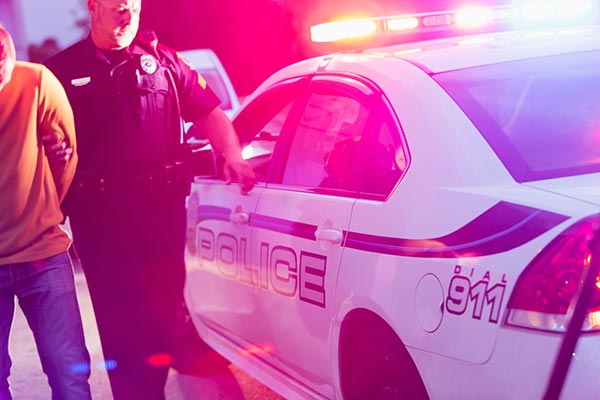Driving Under the Influence of Opiates
When it comes to drunk driving accidents, it isn’t just alcohol that can land you behind bars. Driving under the influence of opiates is illegal in the State of Nevada. As opioid addictions reach crisis levels, driving under the influence of opioids is also a growing problem. Here’s what you should know about DUI opiates in Nevada:
Driving Under the Influence of Opiates in Nevada

Driving under the influence of opiates in Nevada is illegal. Penalty-wise, the charge of DUI opiates is the same as any other DUI charge in Nevada. It’s classified as a drunk driving offense, and it carries the same penalties as other DUI offenses.
There are two ways to be a drunk driver involving opiates. The first way is to be over the legal limit for the type of opiate that you take. The second way is to be under the influence of the opiate so that you can’t drive in a normal manner. It doesn’t matter if you’re lawfully prescribed the drug that you’re taking. As long as you’re over the legal limit or under the influence when you drive, you’re a drunk driver.
Nevada DUI Opioid Laws
Nevada’s DUI opioid laws are found in Nevada Revised Statutes 484C.110. The law says that inhaling, ingesting or using any chemical that makes you unable to safely drive or control a vehicle makes you a drunk driver. That means any chemical, including an opioid, whether it’s legal or not, can make you a drunk driver. Any opioid can fall under the definition of a chemical under Nevada law 484C.110.
The law goes on to establish legal limits for certain drugs. One of the drugs is heroin and heroin metabolite. If you have more than 2,000 nanograms of heroin in your system per milliliter of urine or 50 nanograms of heroin in your system per milliliter of blood, you also fall under the definition of a drunk driver. There are additional legal limits for heroin metabolite, morphine and monoacetylated morphine. You’re also driving under the influence of opiates if you’re unable to drive safely because of a combination of alcohol and opiates.
How Do They Test for Driving Under the Influence of Opiates?
In Nevada, when you drive a motor vehicle, you consent to take a urine or blood test if law enforcement suspects you of DUI opiates. By nature of operating a vehicle in the State of Nevada, you automatically consent to take a blood or urine test. The officer must have reasonable suspicion that you’re driving under the influence to request a test.
The test may be admissible as evidence against you. Even though the test may be strong evidence, if you’re facing a DUI opioids charge, it’s important to look at the drug test result carefully. There may be errors in the testing procedure. Law enforcement may not understand how to interpret the results accurately. There may be an explanation for the test results other than that you were driving under the influence. It’s up to law enforcement to prove the charges against you. You can carefully scrutinize the blood or urine test results in your case to see if there are testing errors or other viable defenses in your case.
What Are the Penalties for DUI – Opiates in Nevada?

The penalties for DUI opiates in Nevada include:
- 6 months jail or 24+ hours community service
- Attendance at DUI school to learn about the dangers of drunk driving
- Attendance at a victim impact panel to hear from victims of drunk driving
- A suspension of your driver’s license for 90 days (you may qualify for a restricted license after 45 days)
- $1,000 fines and court costs
If you’re a repeat offender, the penalties are more serious. A third DUI offense is a felony. All types of DUI offenses like alcohol, drugs and prescription opiates all count as DUI offenses for the purposes of determining if you’re a repeat offender. If your DUI causes injury or death, you face up to 20 years in prison. If you have three or more prior DUIs and you commit DUI causing death, you face up to a life sentence.
Defenses to DUI-Opiates in Nevada
Even if you’re facing a charge of DUI-opiates in Nevada, you may have defenses that are available to you. If law enforcement pulls you over in violation of your constitutional rights, the court may suppress the evidence against you. In addition, if you were just sleeping behind the wheel, you might defend yourself on the grounds that you weren’t ever actually in control of the vehicle. Testing errors or investigation errors can be other grounds for defense.
Also, if law enforcement administers sobriety tests like the walk and turn, horizontal gaze nystagmus and the one-leg stand, those tests may not be valid indicators of whether you’re driving under the influence of opiates. Standardized field sobriety tests are developed to test for the use of alcohol. They may not be accurate at all to determine a person’s intoxication level because of opioid use. The arresting law enforcement officer may not even be aware that they’re conducting an investigation based on field sobriety tests that are standardized for alcohol detection instead of opioid use.
You have the option to take your case to trial. You may also try to negotiate a resolution to less-serious charges like reckless driving. There’s no single, right answer for every DUI opiates charge. Our experienced attorneys for driving under the influence of opiates charges in Las Vegas can help you evaluate the charges against you and determine the best possible path to defend yourself from the charges against you.
Work With Our DUI Attorneys in Las Vegas
If you’re charged with opiates driving under the influence in Nevada, you have rights and you have options. Our DUI-opiates attorneys in Las Vegas can help you build your case, assert your rights and prepare the best possible defense to the charges. How you handle your driving under the influence of opiates charge may impact the rest of your life, so you owe it to yourself to pursue your case aggressively. Contact us today to begin working on your case right away.



